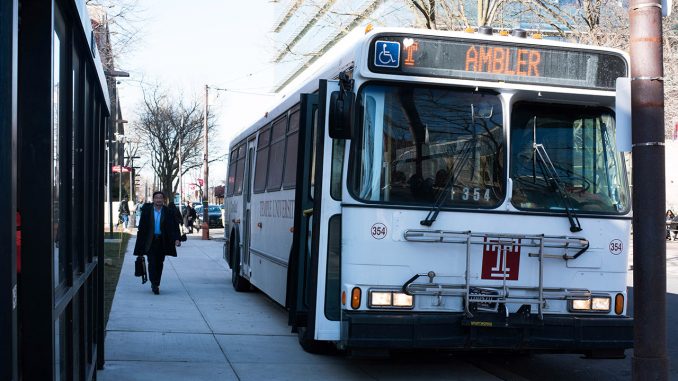
In November, Temple University will replace the commuter buses used to travel to and from Ambler and Main Campus with seven new buses.
For the past year, students commuting between the two campuses have traveled in yellow school buses, traditionally used to transport primary and high school students.
University spokesman Brandon Lausch wrote that the buses were replaced with grade school-style buses because the previous “SEPTA-style buses had reached the end of their life cycle” during the summer semester.
The updated buses will have an increased number of seats, which will be designed to improve back posture during bus rides. Wi-Fi will also become a commodity, said Mark Gottlieb, associate director of service operations, which he believes students will use to its full potential.
Junior accounting major Jordan Reeser, who travels between Ambler and Main Campus for classes, said she is excited to have Wi-Fi on future bus rides, and that she is not the only one that shares this sentiment.
“I did schoolwork on the commute. A lot of people also do,” Reeser said. “I don’t care as long as the new ones have Wi-Fi.”
The new buses will also switch from gasoline to an alternative fuel, propane, which will decrease the amount of harmful pollutants and greenhouse gases the buses produce, and also cut down on fuel costs.
The switch from gasoline or diesel fuel options for the buses will reduce Temple’s daily carbon footprint in terms of transportation. Propane, or liquified petroleum gas, emits 26 percent less greenhouse gases.
“[The buses] are going to be brand new,” Gottlieb said. “Good for the environment and good for the university.”
Propane also has better fuel-efficiency than gasoline and diesel, reducing fuel costs for the new buses. According to a 2014 Clean Cities study from the U.S. Department of Energy, propane gets 7.2 miles per gallon, in terms diesel gallons, while other diesel and gasoline get around 6.8 miles per Diesel Gallon Equivalent.
About 400 students use the buses to go to and from Main Campus and Ambler each day, Lausch wrote.
“While the new buses will resemble school buses, they are actually called commercial buses due to the enhanced rider features,” he wrote. “This type of vehicle was selected for durability and reliability, considering the route that the Ambler-Main Campus buses travel and how many students use the service.”
Jenny Choi, a senior biology major, is one of these 400 commuters that goes between the campuses daily. She said the current buses are comfortable and allow her to nap during her commute.
“I actually don’t mind. It gets me where I need to be,” Choi said. “Honestly, it’s more comfortable to sleep on.”


Be the first to comment